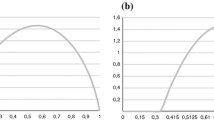Abstract
We introduce a model for voting under uncertainty where a group of voters have to decide on a joint action to take, but the individual voters are uncertain about the current state of the world and thus about the effect that the chosen action would have. Each voter has preferences about what state they would like to see reached once the action has been executed. That is, we need to integrate two kinds of aggregation: beliefs regarding the current state and preferences regarding the next state.
Access this chapter
Tax calculation will be finalised at checkout
Purchases are for personal use only
Preview
Unable to display preview. Download preview PDF.
Similar content being viewed by others
References
Alcalde-Unzu, J., Vorsatz, M.: Size approval voting. Journal of Economic Theory 144(3), 1187–1210 (2009)
Arrow, K.J.: Social Choice and Individual Values, 2nd edn. John Wiley & Sons (1963)
Barberà, S., Bossert, W., Pattanaik, P.: Ranking sets of objects. In: Handbook of Utility Theory, vol. 2. Kluwer Academic Publishers (2004)
Bartholdi III, J.J., Tovey, C.A., Trick, M.A.: How hard is it to control an election? Mathematical and Computer Modelling 16(8–9), 27–40 (1992)
Ben Larbi, R., Konieczny, S., Marquis, P.: A characterization of optimality criteria for decision making under complete ignorance. In: Proceedings of the 12th International Conference on Principles of Knowledge Representation and Reasoning (KR-2010), pp. 172–181. AAAI Press (2010)
Brams, S.J., Fishburn, P.C.: Approval Voting, 2nd edn. Springer (2007)
Brandt, F., Conitzer, V., Endriss, U.: Computational social choice. In: Weiss, G. (ed.) Multiagent Systems, pp. 213–283. MIT Press (2013)
Duddy, C., Piggins, A.: Collective approval. Mathematical Social Sciences 65(3), 190–194 (2013)
Faliszewski, P., Hemaspaandra, E., Hemaspaandra, L.: Using complexity to protect elections. Communications of the ACM 53(11), 74–82 (2010)
Gaertner, W.: A Primer in Social Choice Theory. LSE Perspectives in Economic Analysis. Oxford University Press (2006)
Geist, C., Endriss, U.: Automated search for impossibility theorems in social choice theory: Ranking sets of objects. Journal of Artificial Intelligence Research 40, 143–174 (2011)
Grossi, D., Pigozzi, G.: Introduction to judgment aggregation. In: Bezhanishvili, N., Goranko, V. (eds.) ESSLLI 2010/2011. LNCS, vol. 7388, pp. 160–209. Springer, Heidelberg (2012)
Halpern, J.Y.: Reasoning about Uncertainty. MIT Press (2003)
Kannai, Y., Peleg, B.: A note on the extension of an order on a set to the power set. Journal of Economic Theory 32(1), 172–175 (1984)
List, C., Pettit, P.: Aggregating sets of judgments: An impossibility result. Economics and Philosophy 18(1), 89–110 (2002)
Merrill III, S., Nagel, J.: The effect of approval balloting on strategic voting under alternative decision rules. The American Political Science Review 81(2), 509–524 (1987)
Shoham, Y., Leyton-Brown, K.: Multiagent Systems: Algorithmic, Game-Theoretic, and Logical Foundations. Cambridge University Press (2009)
Xu, Y.: Axiomatizations of approval voting. In: Sanver, M.R., Laslier, J.F. (eds.) Handbook on Approval Voting, pp. 91–102. Springer (2010)
Author information
Authors and Affiliations
Editor information
Editors and Affiliations
Rights and permissions
Copyright information
© 2013 Springer-Verlag Berlin Heidelberg
About this paper
Cite this paper
Endriss, U. (2013). Voting on Actions with Uncertain Outcomes. In: Perny, P., Pirlot, M., Tsoukiàs, A. (eds) Algorithmic Decision Theory. ADT 2013. Lecture Notes in Computer Science(), vol 8176. Springer, Berlin, Heidelberg. https://doi.org/10.1007/978-3-642-41575-3_13
Download citation
DOI: https://doi.org/10.1007/978-3-642-41575-3_13
Publisher Name: Springer, Berlin, Heidelberg
Print ISBN: 978-3-642-41574-6
Online ISBN: 978-3-642-41575-3
eBook Packages: Computer ScienceComputer Science (R0)



